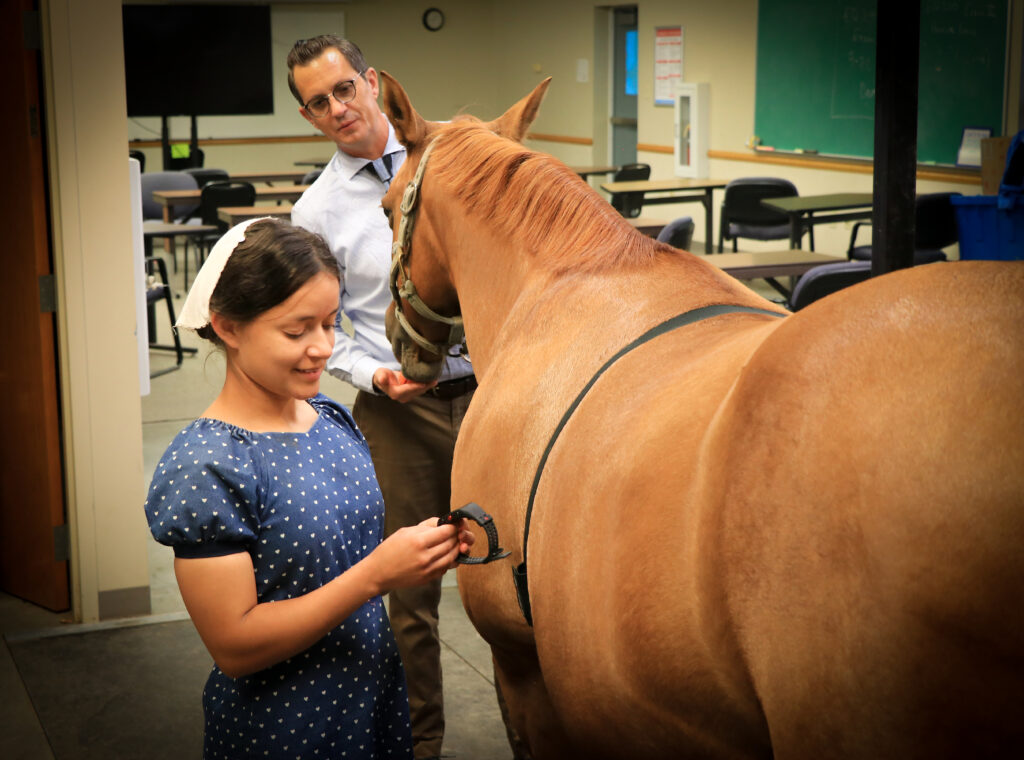New department chair brings unique expertise
The growth, in this case, is quite literal. Edward Ferguson, Ph.D., specializes in reproductive physiology. With his unique background, he has been tasked with expanding the Saint Mary-of-the-Woods College (SMWC) equine studies program to include breeding.
SMWC’s program is already one-of-a-kind for the state, being the only equine program in Indiana to offer a Bachelor of Science degree in equine studies. It’s one of approximately 20 equestrian colleges in the U.S. to offer this type of degree.
Ferguson, a published researcher who has an extensive history teaching equine-related topics, says The Woods has a lot to offer to those who live and breathe horses. He began at The Woods in the summer after relocating from the South. He serves as an associate professor and department chair of the equine studies program.

“When I saw how beautiful this place is — the barns and office layouts — and I met some of the students, I fell in love,” Ferguson said. “When they offered the job, I came running.”
One of Ferguson’s main goals is to establish the breeding program. With his specialization in assisted reproductive technologies and his 15 years of teaching animal reproduction, he believes The Woods will be one of the few schools to offer such a specialized education.
The facilities are on par with a vet school, he explained. With stocks to hold the horses in the classrooms, the animals can be used as an educational tool enabling Ferguson and other faculty to bring the lessons to life. For many of the places he’s either attended or worked in the past, he’s had to drive 20 or so miles to the equine facilities. Having them on campus is a gamechanger, he said.
“Not many places can offer this,” Ferguson said. “Our equine department is probably as knowledgeable as big colleges that don’t have that personal touch that comes from offering the hands-on learning aspects to the students in a low student-to-teacher ratio. When you add that together, that makes The Woods a rare jewel.”
Dottie L. King, Ph.D., agrees expanding on this program is well worth the investment, not only for Woods students but for the community.
“When you think of horses, you often think of Kentucky, but Indiana has a $3 billion equestrian industry,” King said. Strategically looking for partnerships and building this program is one piece of the College’s master plan.
Ferguson is excited to provide a solid education in equine science to students. He won’t just teach them how to memorize the lessons, but how to apply them. The opportunities The Woods provides for students are great, he said. They get hands-on learning and will now be able to get a better research background. For those wanting to go to veterinary school or graduate school, Ferguson said their education gained from SMWC would be “advantageous” for them.
While building the curriculum in the breeding program, Ferguson will continue to conduct research. One of his projects is using lavender aromatherapy on horses to reduce stress. This research is the first of its kind and is cited in textbooks all over the world.
Combining his love for breeding, research and teaching is a dream come true for Ferguson, who grew up on a racehorse farm.
“The chance to come back to just focus on horses is like coming home in the middle of my career,” he said. “I couldn’t be happier.”
In the first year, Ferguson plans to start training students in the process of breeding mares with the College’s mares using donated insemination doses. The resulting foals will then be used for subsequent breaking and training classes on campus. Eventually, Ferguson said, SMWC will be able to raise competition horses.
He would like to expand this service to the community in the following year, he explained. Community members could house their mares on campus where students will perform inseminations and pregnancy exams, as well as basic care for the horses. This not only gives students real-world experience of working on a breeding farm, but it can generate revenue to expand the program and its services.
